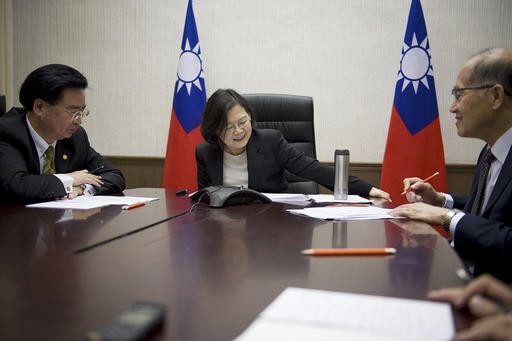US expected to use ‘Taiwan card’ to put pressure on China
The United States has begun to discuss weapon sales to Taiwan, and is apparently trying to use this possible military aid as a bargaining chip in upcoming negotiations with China over trade and foreign exchange issues.
Change Size
 In this Friday, Dec. 2, 2016 photo released by Taiwan Presidential Office Saturday, Dec. 3, 2016, Taiwan's President Tsai Ing-wen (center) flanked by National Security Council Secretary-General Joseph Wu (left) and Foreign Minister David Lee, speaks with US President-elect Donald Trump through a speaker phone in Taipei, Taiwan. (Taiwan Presidential Office via AP/-)
In this Friday, Dec. 2, 2016 photo released by Taiwan Presidential Office Saturday, Dec. 3, 2016, Taiwan's President Tsai Ing-wen (center) flanked by National Security Council Secretary-General Joseph Wu (left) and Foreign Minister David Lee, speaks with US President-elect Donald Trump through a speaker phone in Taipei, Taiwan. (Taiwan Presidential Office via AP/-)
T
he United States is considering selling state-of-the-art F-35 stealth fighter jets and the Terminal High Altitude Area Defence (THAAD) system to Taiwan, among other items. Taiwan is aiming to develop submarines on its own, but its technology is said to be insufficient. Therefore, the administration of US President Donald Trump is also considering a plan to transfer related technology to the island.
Due to budgetary constraints, Taiwan may not be able to purchase all weaponry that the United States may offer. However, such arms sales, if realized, will almost fully satisfy Taiwan’s requests.
China has been rapidly boosting its military spending to build up its arms. Increasingly alert to such moves, Taiwan has been calling on the United States to sell to the island new fighter jets and diesel-powered submarines. However, the administration of former US President Barack Obama rejected the request, partly in consideration for China. Instead the United States only helped improve the fighter jets Taiwan already possessed, or sold it multipurpose helicopters.
According to sources familiar with US-Taiwan relations, the United States did not even allow Taiwan to request arms sales from 2011 to 2015.
The Trump administration will likely alter the former Obama administration’s China policy.
According to sources, the possible lineup of senior officials of the US Defence and State departments includes Randall Schriver, a former deputy assistant secretary of state who is known for his pro-Taiwan position and hard-line stance against China, and Stephen Yates, former deputy assistant to former Vice President Dick Cheney and a China-Taiwan relations specialist. If they join the Trump administration, the United States’ China policy may shift to a hard-line course.
Regarding a meeting with Chinese President Xi Jinping, which is scheduled for Thursday and Friday, Trump tweeted on March 30 that the meeting “will be a very difficult one.”
Trump will likely step up pressure on China if Xi does not present satisfying answers to pending matters between the United States and China, such as North Korea’s nuclear and missile development as well as trade and foreign exchange issues.
A source close to US-China relations said all China can probably do in the upcoming talks is directly win assurance from the United States that Washington supports the “one-China” policy.
If the Trump administration decides to sell arms to Taiwan, it will inevitably draw a strong reaction from China. When the United States decided on arms sales to Taiwan several times in the past, China put pressure on Washington, suspending military exchanges between the two countries.
China insists that Taiwan is its non-negotiable “core interest.” China may call on the Trump administration to refrain from offering military cooperation to Taiwan by pledging its cooperation on North Korean issues, as well as trade and foreign exchange policies.
This article appeared on The Japan News newspaper website, which is a member of Asia News Network and a media partner of The Jakarta Post









